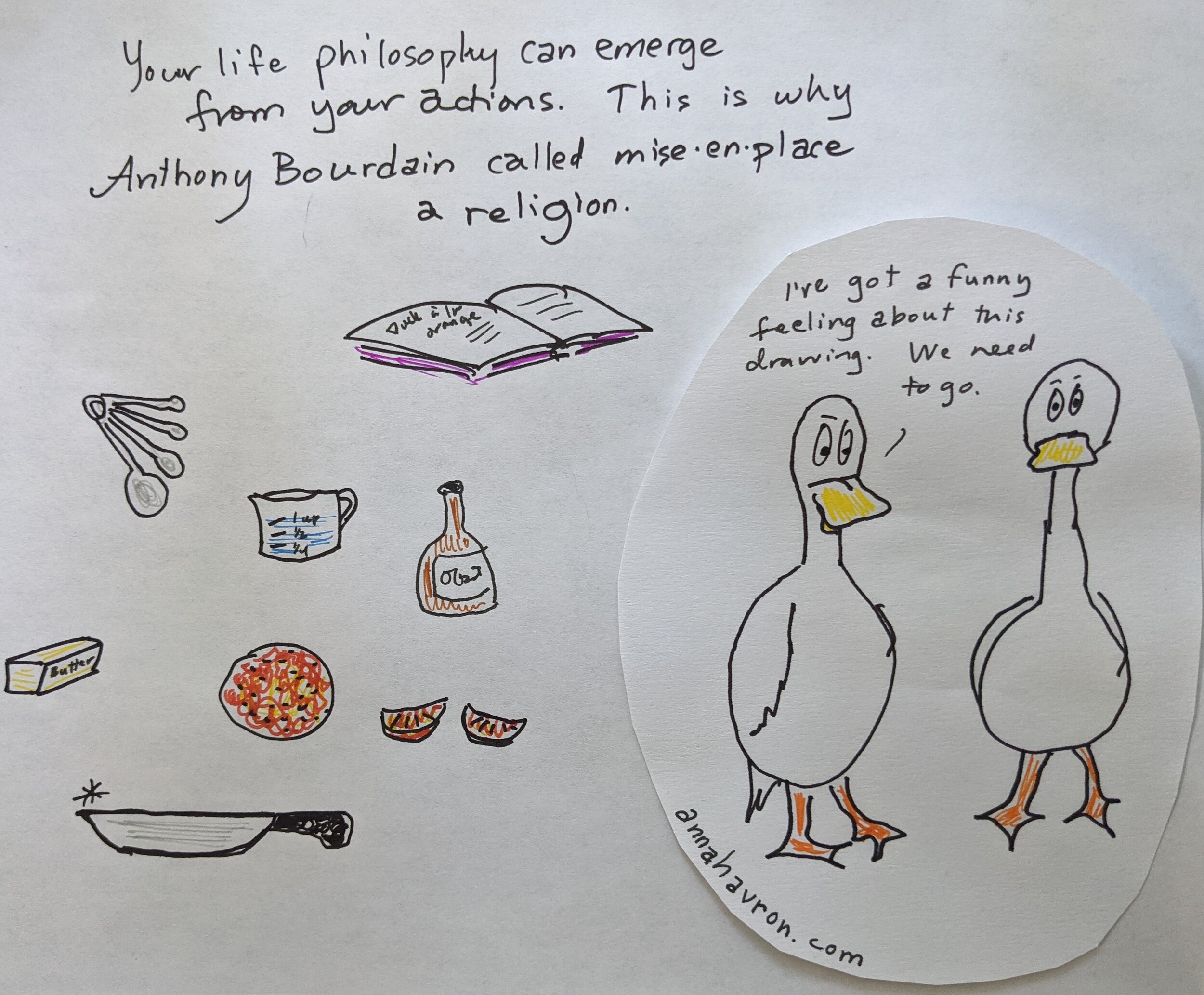Greet the Day: When Your Life Philosophy Emerges from Your Daily Actions
A life philosophy is the set of beliefs and values you live out. And this is reversible: the actions you repeatedly do can help you articulate a whole life philosophy. It’s a two-way street.
Starting with a belief or philosophy can be a dead end. I once had the belief that if my mind was distracted and unsettled, buzzing with anxiety, my mind should tell itself to calm down and focus. (In some situations, this can work. )
Now when I feel agitated, I’ve learned that if I relax my body, my mind settles down and relaxes, too. When I notice myself ordering my mind to settle down (which only makes me feel more stressed!), I find that if I take some slow, deep breaths instead, my mind automatically grows more peaceful.
The path to relaxing my mind was to take action by slowing my breathing.
And sometimes the path to finding a life philosophy — figuring out what matters most to us — is to start with actions rather than beliefs.
When we create a personal framework, our values guide our actions. The goal is to consciously work to link our values with our actions. However, our actions also reveal and shape our values.
It’s more of a dialogue than a hierarchy.
Getting your ducks in a row.
One of my favorite books is Work Clean by Dan Charnas. Charnas writes about the holistic organizational system that chefs have used for centuries to get multiple complex meals on tables in high-pressure environments.
The system is called “mise-en-place,” a French term that means “putting things in place.” Anthony Bourdain called mise-en-place the cook’s religion.
Mise-en-place means so much more than having your ingredients chopped ahead of time, set out in little bowls. Charnas visits a culinary school and several professional kitchens to detail how this system includes intensive practices of planning and prep work, and time-honored strategies for responding effectively in pressured, chaotic workplaces. Charnas found that some chefs consider mise-en-place to be a spiritual practice.
Practicing mise-en-place encourages presence, staying in the moment. It enables one to stay relaxed and at peace in fast-moving situations. It moves from what a chef does in the kitchen to a chef’s whole approach to life (Charnas 2016, p 44):
[Chef Dwayne] LiPuma found a pithy phrase that encapsulated what he’d learned in the kitchen, courtesy of his brother-in-law, Pierre, a successful executive: Greet the day. On his way to work, LiPuma saw commuters dashing for the subway—flustered, sweating, stumbling—and the next day, he’d see those same commuters rushing again. After working in the kitchen, LiPuma couldn’t understand what was wrong with these people. Why not get up a half-hour earlier? Wasn’t greeting your day better than fighting it? Why not make your kid’s lunch the night before, lay out your clothes, do anything you need to do so you can get up and not run around like a maniac so you can smile and enjoy your day? That was, after all, what LiPuma was beginning to do in the kitchen. Stress and chaos were a normal part of his job. But if he could control a little bit of that chaos—preparing for what he knew was going to happen—he could greet chaos, embrace it. His mastery of the expected would enable him to better deal with the unexpected.
What kind of person does LiPuma want to be?
Someone who “greets the day.” Someone who begins the day well. Someone who is relaxed and at peace instead of being needlessly harried and stressed.
That’s the philosophy.
What are the actions he does to ensure that he is ready to live out his value of greeting the new day? The night before, he prepares, maybe even uses a checklist if he needs it. He lays out clothes, makes the next day’s lunch.
That’s the practice.
It’s a two-way street.
References
Charnas, Dan. Work Clean: The Life-Changing Power of Mise-En-Place to Organize Your Life, Work, and Mind. New York, NY: Rodale Books, 2016.
(Work Clean was later published in paperback under the title, Everything in Its Place: The Power of Mise-en-Place to Organize Your Life, Work and Mind.)
